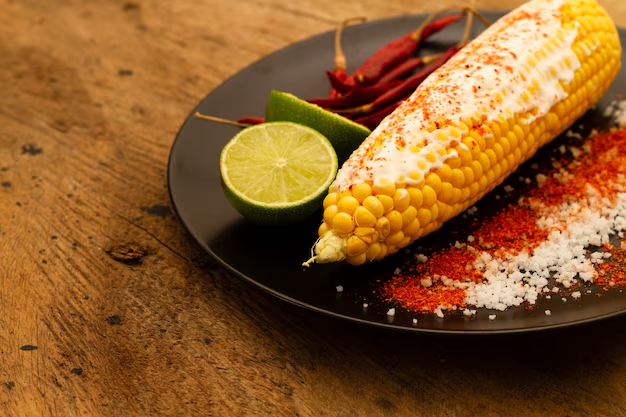Discover How Fresh Corn Can Last in the Refrigerator: A Guide to Maximizing Freshness
As the summer season beckons, bringing juicy, fresh corn to the table becomes a delightful tradition. However, as much as we love indulging in perfectly cooked corn, it often warrants a question: how long can fresh corn last in the refrigerator before it loses its flavor and texture? Let's explore the storage dynamics of corn, providing you with the information needed to enjoy its full potential, while minimizing food waste.
🏡 Understanding Fresh Corn's Shelf Life
Before we dive into storage strategies, it's crucial to understand why fresh corn doesn't remain fresh indefinitely. The shelf life of corn, like any vegetable, is determined by its natural composition and the environment in which it's stored. Fresh corn contains sugars that begin converting into starch soon after being harvested, affecting both flavor and texture. Refrigeration can slow this process, yet several factors, such as packaging and temperature, influence how long corn can feasibly last.
Factors Affecting Corn's Longevity
- Temperature: Refrigeration maintains a cold environment that slows spoilage by reducing microbial activity and nutrient degradation.
- Moisture: Corn husks act as a natural barrier against drying out, maintaining moisture levels during storage.
- Packaging: Sealed containers or plastic bags can help retain moisture and prevent external contamination.
Understanding these elements helps in optimizing fresh corn storage and extending its edible life.
🚪 The Lifespan of Fresh Corn in the Refrigerator
Fresh corn, when stored appropriately, can remain in good condition for about 5 to 7 days. However, its peak flavor is often best enjoyed within the first two or three days of refrigeration. During this time, the sugar-to-starch conversion occurs at a slower pace, allowing you to savor corn at its sweetest.
Signs Your Corn is Pending Spoilage
- Visual Cues: Look for a change in color; fresh corn is typically vibrant with bright green husks. As it spoils, it might turn pale or brownish.
- Texture Changes: Spoiled corn may feel slimy or overly dry.
- Smell Test: A sour or unpleasant odor is a clear indicator that it's time to discard your corn.
🌽 Best Practices for Storing Fresh Corn
To maximize the lifespan and flavor of fresh corn, follow these actionable tips for effective storage:
Keep It in the Husk
Leaving corn in its natural husk acts as a snug cover that maintains freshness. It helps preserve moisture and acts as a physical shield against spoilage.
Refrigerate Promptly
As soon as you bring corn home, refrigerate it immediately to slow sugar conversion and keep it flavorful. Ensure your refrigerator is set to a proper cooling temperature—even slight variations can alter the freshness period.
Use Plastic Bags
Store corn in plastic bags while ensuring air circulation to prevent moisture buildup. You can loosely wrap the corn in bags, leaving gaps for air flow to regulate humidity without inviting bacteria.
Avoid Washing Pre-Storage
Washing can introduce moisture that leads to mold growth and rapid spoilage. If necessary, wash the corn right before cooking to maintain ideal moisture levels while reducing bacterial risks.
🥘 Preparing Corn for Longevity and Flavor
Fresh corn can be preserved beyond a week's lifespan by freezing or processing it into various forms, extending enjoyment far beyond the summer months.
Freezing Corn
Freezing extends the shelf life of corn substantially without sacrificing quality. Here's a straightforward method to ensure you have corn on hand all year:
- Blanch the Corn: Briefly boil ears of corn for 4-6 minutes to deactivate enzymes that could spoil the corn.
- Cool Quickly: After blanching, immerse corn in ice water to halt the cooking process.
- Cut and Package: Slice kernels off the cob and pack them into airtight containers or freezer bags.
- Label Clearly: Mark each package with the date to track storage duration.
Benefits of Frozen Corn
- Maintains nutritional value much longer than refrigerating.
- Versatile in recipes, such as soups, stews, and casseroles.
- Reduces waste, preventing unused corn from spoiling.
Canning Corn
For those with a penchant for canning, this method provides an extended shelf life of up to a year, ensuring you have a stock of ready-to-use corn.
- Pressure Canning: This process requires specific equipment and adherence to guidelines to ensure safety and quality.
- Flavor Preservation: Season or leave corn plain, allowing flexibility during meal preparation.
📖 Summary Table: Key Storage Tips for Fresh Corn
| Action | Motivation | Outcome |
|---|---|---|
| Refrigerate promptly | To slow sugar conversion | Maximizes sweetness and texture |
| Keep husks intact | Natural moisture barrier | Extended freshness |
| Store in plastic bags | Prevents contamination and moisture build-up | Prolongs shelf life |
| Avoid pre-washing | Prevents mold growth | Maintains ideal moisture levels |
| Freeze extra corn | Longer storage and versatility | Retains fresh-like quality in dishes |
🍽️ Creative Ways to Enjoy Corn
The versatility of corn makes it a staple ingredient in various culinary creations. Here’s how you can savor its delightful taste beyond simply boiling or steaming:
- Grilled Corn: Enhance natural sweetness with slight charring. Add lime juice or spice it up with chili powder for an extra kick.
- Corn Salad: Incorporate with fresh herbs, avocado, and cherry tomatoes for a refreshing summer salad.
- Corn Soup: Blended with spices and cream, corn transforms into a cozy, rich soup perfect for any season.
🌟 Conclusion Insight: Embrace Corn's Versatility
Grasping the subtleties behind corn storage affords you the luxury of enjoying this sweet, succulent vegetable in myriad ways. Whether refrigerating fresh corn for immediate delight, storing it for an offseason treat, or incorporating it into creative recipes, understanding the preservation techniques allows you to relish the full richness of corn at its best.
Through mindful storage and preparation, your kitchen remains stocked with this vibrant addition, reducing waste, boosting health, and perpetually tantalizing your taste buds with nature's golden kernel.

